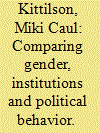|
|
|
Sort Order |
|
|
|
Items / Page
|
|
|
|
|
|
|
| Srl | Item |
| 1 |
ID:
096298


|
|
|
|
|
| Publication |
2010.
|
| Summary/Abstract |
Integrating the behavioral and institutional approaches to comparative politics will provide a more comprehensive theoretical framework for understanding why differences in political engagement among men and women vary cross-nationally and cross-temporally. This essay advances the argument that gender-related policies and institutions are not only outcomes in the political process, but also exert powerful influence over citizens' interests, values, and perceptions of politics. This policy feedback loop has implications for a wide array of political attitudes and activities-from political interest to running for elected office. Specifically, the adoption and expansion of national policies on issues such as equal wages, childcare provision, paid maternity leave, and violence against women carry important messages to the electorate: Issues that disproportionately affect women, long considered private, have become important national policy choices.
|
|
|
|
|
|
|
|
|
|
|
|
|
|
|
|
| 2 |
ID:
072257


|
|
|
|
|
| Publication |
2006.
|
| Summary/Abstract |
How do rising levels of international interconnectedness affect social, economic, and political conditions for women? Research on gender and international relations frequently offers clear propositions but seldom submits them to broad, quantitative testing. This article begins to fill that gap. We advance the hypothesis that, on balance and over time, increasing cross-national exchange and communication lead to improvements in women's status and equality. Economic aspects of globalization can bring new opportunities and resources to women. But equally important, globalization promotes the diffusion of ideas and norms of equality for women. In an analysis of 180 countries from 1975 to 2000, employing cross-sectional-time-series regression techniques, we examine the impact of several measures of globalization on women's levels of life expectancy, literacy, and participation in the economy and parliamentary office. International trade, foreign direct investment, membership in the United Nations (UN) and World Bank, and ratification of the Convention on the Elimination of All Forms of Discrimination Against Women (CEDAW), are associated with improved conditions for women.
|
|
|
|
|
|
|
|
|
|
|
|
|
|
|
|
|
|
|
|
|